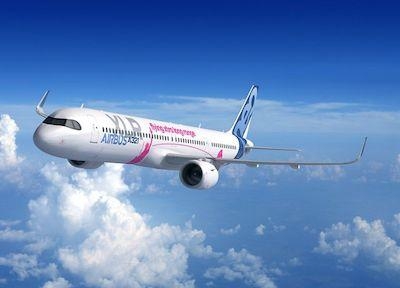Tue, Jun 18, 2019
The Latest Evolution Of The A321neo Has A 4,700nm Range
Following the very positive feedback from the market, Airbus has launched the A321XLR to complement its best-selling A321neo Family. The A321XLR thus becomes the next evolutionary step which responds to market needs for even more range, and creates more value for the airlines by bringing 30% lower fuel burn per seat than previous-generation competitor aircraft. Starting from 2023, the aircraft will deliver an unprecedented Xtra Long Range of up to 4,700nm – 15% more than the A321LR and with the same fuel efficiency.

With this added range, airlines will be able to operate a lower-cost single-aisle aircraft on longer and less heavily travelled routes – many of which can now only be served by larger and less efficient wide-body aircraft. This will enable operators to open new world-wide routes such as India to Europe or China to Australia, as well as further extending the Family’s non-stop reach on direct transatlantic flights between continental Europe and the Americas. For passengers, the A321XLR’s new Airspace cabin will provide the best travel experience, while offering seats in all classes with the same high-comfort as on long-haul widebody aircraft.
The A321XLR has been designed to maximize overall commonality with the A321LR and the rest of the A320neo Family, while introducing minimal changes needed to give the aircraft an Xtra Long Range with increased revenue payload.
The changes include:
- the new permanent Rear Center Tank (RCT) for more fuel volume
- a modified landing gear for an increased maximum take-off weight (MTOW) of 101 metric tons
- an optimized wing trailing-edge flap configuration to preserve the same take-off performance and engine thrust requirements as today’s A321neo
In particular, the new optimized RCT holds more fuel than several optional Additional Center Tanks (ACTs) did previously, while taking up less space in the cargo hold – thus freeing-up underfloor volume for additional cargo and baggage on long range routes.
(Image provided with Airbus news release)
More News
Its Offerings Are Lighter, Cleaner, and Now Pushing Past 1,000nm on SAF Jet Fuel DeltaHawk’s diesel-powered aircraft lineup has seen incredible upgrades over the last few yea>[...]
The Airplane Experienced A Total Loss Of Engine Power On December 3, 2025, about 1600 central standard time, a Mooney Aircraft Corp. M20K, N57229, was substantially damaged when it>[...]
Make Sure You NEVER Miss A New Story From Aero-News Network Do you ever feel like you never see posts from a certain person or page on Facebook or Instagram? Here’s how you c>[...]
Aero Linx: European Society of Aerospace Medicine (ESAM) As a pan-European, independent forum, it works to promote the safety and health of all persons involved in aviation and spa>[...]
“We are excited to see Wisk achieve this milestone, and I’m so proud of the team that made it possible. The team at Wisk has built advanced technologies across flight c>[...]
 Aero-TV: DeltaHawks Diesel Power Steps Into the Spotlight
Aero-TV: DeltaHawks Diesel Power Steps Into the Spotlight NTSB Prelim: Mooney Aircraft Corp. M20K
NTSB Prelim: Mooney Aircraft Corp. M20K ANN FAQ: Turn On Post Notifications
ANN FAQ: Turn On Post Notifications ANN's Daily Aero-Linx (12.20.25)
ANN's Daily Aero-Linx (12.20.25) Aero-News: Quote of the Day (12.20.25)
Aero-News: Quote of the Day (12.20.25)



